This small farming community near the Gaza Strip was the scene of one of Saturday’s deadliest attacks by Hamas militants, who killed more than 1200 people across Israel. Now it is a staging ground for Israel’s counterstrike.
Hundreds of Israeli soldiers were assembling near bloodstained homes, abandoned Hamas pick-up trucks and bodies of residents and militants in the fields to prepare for what the military is calling a paradigm-changing offensive against Hamas’s Gaza stronghold.
Across southern Israel, Israeli soldiers said they were ready, even impatient, to fight.
“I’ll give it to you straight,” said an Israeli soldier who declined to give his name. “I am looking for revenge. We are all out for revenge.”
Israeli military officials said around 70 fighters from Hamas, which the US and other countries deem a terrorist organisation, stormed Kfar Aza, killing dozens of members of the 700-strong kibbutz community, whose homes lie within view of Israel’s border with Gaza.
Officials said they found the mutilated bodies of women and children scattered across the kibbutz. Some residents, Israeli soldiers said, had been decapitated.
“It’s not a war or a battlefield,” Maj. Gen. Itai Veruv, head of the Israel Defence Forces Depth Command, told reporters at the kibbutz. “It’s a massacre.” Hamas’s onslaught devastated a series of kibbutzim – communities inspired by egalitarian ideals that played a central role in building Israel – that lie along the road that runs north-south near Israel’s border with Gaza. Israel had long seen the villages as a first line of defence and encouraged people to live there, promising to provide security.
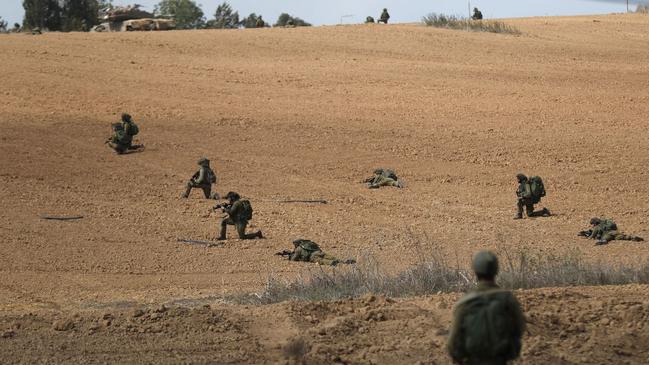
The kibbutz of Be’eri also suffered one of Saturday’s deadliest attacks. The close-knit community of 1150 members always believed the Israeli state would protect it. The Hamas militants who streamed in from Gaza shattered that assumption.
“Our contract with the state has been broken,” said Alon Pauker, a 57-year-old resident who hid in a shelter with his wife during Hamas’s attack on Be’eri until Israeli soldiers reached them on Saturday evening.
“The army came too late.” Around 100 residents of Be’eri were killed, according to rescuers who collected bodies there. Survivors said dozens were still missing, with some taken hostage by Hamas.
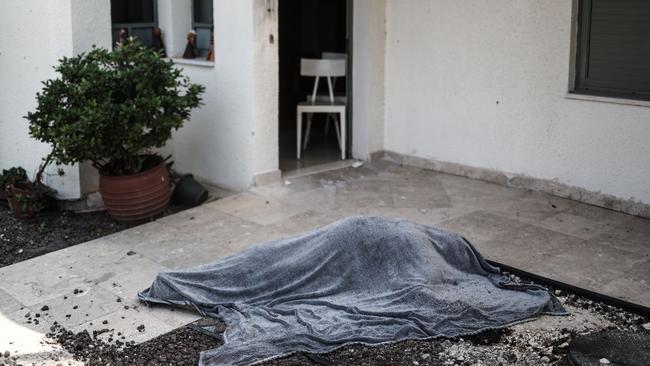
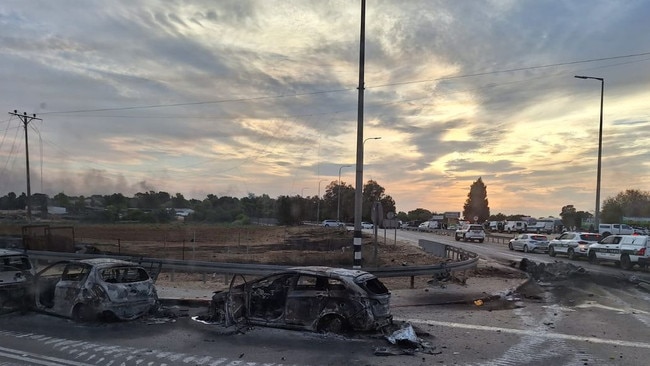
They described seeing charred buildings and trees, bloodied bodies and bullet-ridden cars as they came out of their shelters at Be’eri. Most of them are now grieving together at hotels near the Dead Sea, struggling to understand why they were left to fend for themselves.
After Saturday’s surprise attack, Kfar Aza lay littered with cars and pick-up trucks bearing white-and-green Palestinian license plates, driven from Gaza by Hamas fighters. Empty canisters for rocket-propelled grenades lay strewn next to one militant’s Toyota Hilux.
Col. Liron Batitio, commander of Israel’s Givati infantry brigade, led his soldiers into a fierce fight on Saturday against the Hamas fighters at Kfar Aza, who lay waiting for his forces when they arrived and used the kibbutz’s rooftops to fire rocket-propelled-grenades at the advancing Israeli troops.
“It was one hell of an ambush,” Batito said Tuesday night amid the constant boom of Israeli strikes hitting the nearby Gaza Strip.
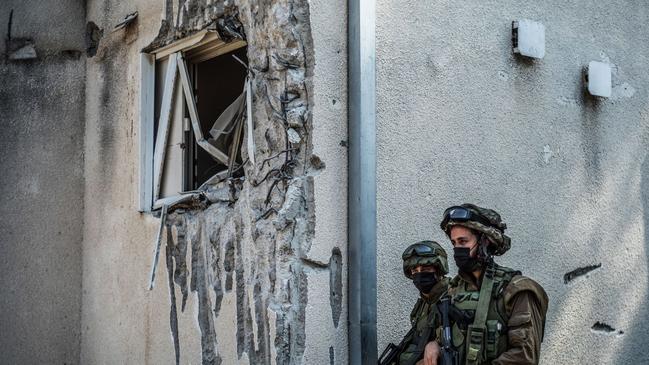
The soldiers received frantic messages from people who were trapped in their homes and trying to stop Hamas fighters from entering their bomb shelters. Batito said it took his soldiers two days to flush out the last of the militants from the kibbutz, including some who hid in bomb shelters. Soldiers are still checking homes for booby traps.
Residents of Kfar Aza were evacuated soon after the attack. Survivors are shocked and angry. On Israel’s Channel 14 on Tuesday, one resident couldn’t contain his rage as he lashed out at Prime Minister Benjamin Netanyahu.
“Mr Prime Minister, go in front of the press and apologise for the thousands of people who were murdered on your watch,” shouted Shirel Hogeg, whose sister, her husband and their infant suffered serious burns after Hamas militants set their house on fire.
The kibbutz has been transformed into a military base. Batito and his men are turning their attention toward the looming offensive. “What will happen to the other side will be 10 times worse than what happened to us, ” he said.
Israeli officials said they had regained control of the major cities, towns and rural communities. Batito said there were still holes in the security fence along the Gaza border.
On Tuesday evening, soldiers rushed to respond to a fresh attack by several Hamas militants in Mefalsim, a kibbutz about 3 miles (5km) from Kfar Aza. The Israeli military said it killed two militants near Mefalsim and waged a fierce firefight with others.
‘We’re trying to pull ourselves together. We’re all like zombies here.’
The kibbutz of Be’eri came under fire from rockets around dawn on Saturday. Local resident Golan Abitbol grabbed his handgun and told his wife and four children to get inside the fortified shelter room of their house. His wife, Hagit, pleaded with him to join them. “I can’t, it is my duty,” she said he told her.
The family spent 20 agonising hours in the shelter, not knowing how Abitbol, a pharmaceutical consultant who had served in the army, was faring outside. They knew through mobile-phone chat groups that Hamas militants had entered their community and begun a house-to-house killing rampage. Only at 2am the next day, when Israeli soldiers arrived at their house, was the family reunited.
The attack came after hundreds of Be’eri residents had gathered on Friday evening in an auditorium to celebrate the 77th anniversary of their kibbutz, sharing childhood memories. They were proud that Be’eri was one of the few kibbutzim in Israel that retained a system of pooling together everyone’s income for equal distribution.

As they heard the first rockets early on Saturday, many Be’eri residents thought it was another routine attack. All houses had safe rooms made of iron. Some families left their shelters after a few minutes and went about their morning.
But just before 6am, two armed militants entered the kibbutz’s main gate, which had opened for a civilian car, whose driver they shot, according to security-camera footage.
Ofer Gitay, who lived in the centre of the kibbutz, had already gone into his shelter with his wife and four children after hearing the rockets. About an hour later he heard militants speaking Arabic outside his home. He warned other residents through a community chat group to stay sheltered.
The chat was quickly flooded with residents’ reports of militants encircling their homes. More gunshots were heard. Hamas fighters killed or dragged away residents who hadn’t taken shelter in time. Sheltering families huddled in silence with their children as militants tried to smash their locks. When that didn’t work, militants threw hand grenades and set houses on fire to try to smoke people out.
Gitay fielded desperate messages and phone calls from neighbours. “They’re shooting me, they’re shooting me,” one local woman screamed over the phone before the line was cut off, he said. He also heard his neighbour upstairs get kidnapped.
Ran Kafri, his wife and stepson, jumped barefoot out of their shelter’s window to escape from the militants who were trying to force their way in. The three ran toward the home of Kafri’s father as shots and explosions rang out around them. “I was focused on moving, I don’t think I had time to panic,” said Kafri. The family hid for three hours near a burning house before they reached his father’s house.
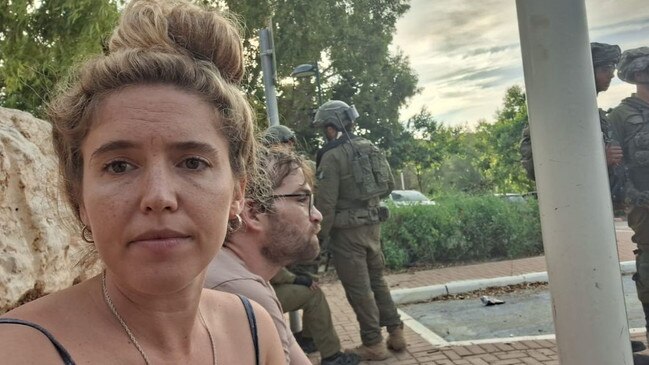
Nahar Neta said one of his siblings spoke by phone with their mother Adrienne Neta, a 66-year-old nurse, who was hiding in her shelter. Around 9.45am the sounds of screaming and men breaking in were audible. “That was our last contact with her,” said Neta.
Since then, he and his sister have been scouring social media for footage that might show their mother still alive. “Our hope, which is a little bit ridiculous at this point to say, is that she is held hostage in Gaza and not dead on the street,” he said.
Noa Kan, a PhD student who was visiting her boyfriend, Yoav Lingwood, in Be’eri, sheltered for 11 hours. The couple didn’t come out even when the Israeli military approached around 5pm. They heard soldiers running and screaming at each other to watch out for the militants, so they worried about being mistaken for militants. “We thought opening our window might scare them,” said Kan.
Only when neighbours texted them, saying they were at the door, did Kan and her boyfriend feel safe to emerge.
When the couple later reunited at the gate of the community with Lingwood’s mother who lived in a separate house, Kan said she broke down and cried.
“We’re trying to pull ourselves together,” she said. “We’re all like zombies here.”
Ari Flanzraich and David S. Cloud contributed to this article.
The Wall Street Journal


More Coverage
Add your comment to this story
To join the conversation, please log in. Don't have an account? Register
Join the conversation, you are commenting as Logout